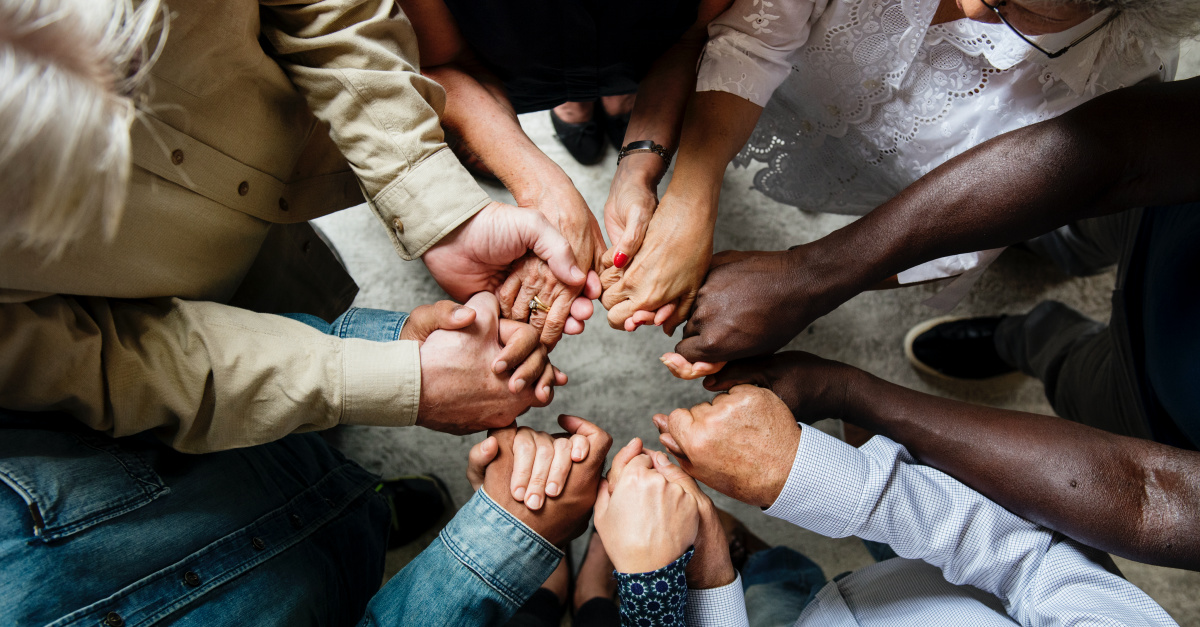When I first learned of “Confessional Communities,” I wasn’t sure what to think. I resonate with the words recorded in Psalm 32:1-2, which state, “Blessed is the one whose transgressions are forgiven, whose sins are covered. Blessed is the one whose sin the LORD does not count against them and in whose spirit is no deceit.” I like the idea of living with complete absolution—inside the privacy of my prayer closet. But exposing the ugliest parts of myself to others? The thought stirred anxiety within me, largely because of times when my weaknesses and faults were met with judgment and rejection rather than grace.
I wonder if you would say the same. Perhaps you joined a Bible study hoping for connection, for healing, and left with increased shame.
The communities Dr.Thompson and his team create, train, and multiply have the opposite effect. These groups form spaces designed to help people feel known, seen, and soothed. Using his psychotherapy experience, love for Scripture, and understanding of neural biology, he is working to create environments where, through the empathetic responses of others, individuals can heal and become the beautiful expressions of the Triune God for which they were created.
Curiosity sparked after discussing Thompson’s latest release, The Deepest Place, for an upcoming Faith Over Fear podcast episode. I engaged him in conversation to learn more about the transformative movement that emerged through his practice and discovered that his organization, The Center for Being Known, is making lay-led communities available.
More Than Group Therapy
“What we call Confessional Communities came from a number of different threads and streams that came to converge in our practice,” he said. “It all began probably 15 or 20 years ago but has really crystalized in the last 8-10 years.”
The ultimate purpose of Confessional Communities goes deeper than what some might refer to as “group therapy.”
“Now, people come with all kinds of initial complaints,” Thompson said. “They’re coming for their marriage, or anxiety, or depression, or substance abuse. There’s a range of different doorways by which people enter. … But we are quick to remind and point out to people that those things are all true, but much bigger than that is this question of spiritual formation.”
In discussing the importance of this, Dr. Thompson explained various ways we humans are being formed each day—from the news we watch, books we read, social media content we consume, and more. “The question is,” he said, “who is the community in which you embed that is forming you, and what is the story that you believe you’re living in, that is forming that community?”
Confessional Communities exist within a biblical understanding of the nature of what it means for us to be human. Within that context, these groups operate based on “interpersonal neurobiology principles regarding what the mind is,” Thompson said, “how the mind operates, and the mechanics of what it looks like to flourish as human beings.” All of this is applied through group psychotherapy dynamics.
Thompson clarified: “What we’re really talking about is, what does it mean to pay attention to the nature of how interpersonal systems work. So, it’s not just how does the mind work within me? But what happens in a group when the group starts to talk with each other?”
These communities meet weekly for 90 minutes. “There’s nothing about our lives that we do not talk about,” he said. People have found these interactions so profound; some have asked, “Why can’t this be church?” Others have said the experience was the most transformative they’d engaged in, and still others expressed sorrow that their parents hadn’t connected with something similar. In response to these powerful statements, Thompson reminds us that the role of church, Confessional Communities, and all of Christian living is that we’d be conformed to the image of Jesus.
How People Change
When asked what it was about these communities in particular that led to such healing, he pointed to the mechanics of how people change. Often, it’s not through book reading alone that we most heal, learn and grow, at least in terms of what it means to become more like Christ, as helpful as those practices can be. Rather, it is through our interactions with others. For example, he shared how, many times as he meets with patients, things they do and say have taught him a great deal about himself, and he often experiences personal transformation due to the work they’ve done.
He explained that, while he would never use a client’s therapy time to discuss himself in this manner, his professional interaction in session does have a drawback. “A patient doesn’t really get the opportunity to recognize how their telling their story vulnerably is actually a way for others to know healing.” For example, what one person shares often evokes things in others that they’ve kept locked away for years, and perhaps over which they’ve held a grudge.
This, in turn, benefits the storyteller. “One of the major ways in which we know healing in our own lives is allowing our vulnerability to be the agency of healing for others,” Thompson said. “My experience of healing includes the work I do to advance the healing of others.”
Another challenge with individual therapy is ways in which patients often try to avoid, subconsciously, talking about the very things that drive their problems. While he might catch some of these self-protective tendencies, he recognized that he won’t catch them all. “There will be places where we have common blindspots,” he said. “Because it’s not that tough to fool one person. But put you in a room with seven other brains, and it is really difficult for you to outflank anybody because all of the angles intended to circumvent the questions I ask are covered in a circle. And so, what the therapist doesn’t pick up, perhaps somebody else in the room does.”
When speaking with potential members, he emphasizes that they will both give and receive help, adding, “But the way you’re going to be helpful is not with your wit and your wisdom. You’re going to be helpful by giving [community members] your vulnerability.” This isn’t about coming and receiving information to then take home and apply. Instead, it’s about a person engaging their shame by allowing others to see it.” To those who say they’d rather not do that, Thompson replied, with a note of sadness in his voice, “Right. Evil’s counting on that. Evil wants you to remain silent and alone with [your shame] so that it can continue to use it to strengthen the abscess. It will try to use it to devour you.”
The Physics of Relational Mass Effect
He concluded our discussion with the third way these groups create such healing and transformation. “I don’t have data on this, so I’m saying this lightly,” he said. “We don’t have enough scientific information about it. But I’ll say it this way—what I call the physics of relational mass effect. If I tell you a vulnerable story, that’s one thing. But if I tell my story to you and two other or three other people in the room at the same time, my brain is not experiencing empathy from just one other brain. It’s experiencing empathy from multiple people.”
After comparing a wheelbarrow to a train, both moving at three miles per hour, he said, “Shame is like a locomotive. Alone, we can’t stop it.” Tearing up, he added, “What a community does—it builds a bigger train. When I have the weight of six or seven or eight people who are saying, ‘We aren’t leaving the room. You can bring as much shame into this room as you want to. It cannot compete with us.’ That is a mind changer. That is a heart renewer. That is renewal of the brain, that is all a reflection of the first two pages of the Bible.”
I’ve witnessed faith groups that did not handle shame well. I’ve heard numerous stories over the years of already wounded men and women who have been further hurt by the church. Therefore, I’m deeply encouraged by the work God is doing through Dr. Thompson and his team.
Can you imagine what might happen, the healing that might occur, if everyone had the opportunity to feel completely known and deeply loved, even in their most shameful places? To have someone listen, without judgment or offering advice, and say, “I see your pain, and I’m not going anywhere”?
Visit the Center for Being Known to learn more, and watch for my discussion with Dr. Thompson on the Faith Over Fear podcast as he discusses suffering and the formation of hope. The episode is scheduled to drop on July 30th, 2024.
Photo Credit: ©Getty Images/Rawpixel
Jennifer Slattery is a writer and speaker who hosts the Faith Over Fear podcast. She’s addressed women’s groups, Bible studies, and writers across the nation. She’s the author of Building a Family and numerous other titles and maintains a devotional blog at JenniferSlatteryLivesOutLoud.com.
As the founder of Wholly Loved Ministries, she’s passionate about helping women experience Christ’s freedom in all areas of their lives. Visit her online to learn more about her speaking or to book her for your next women’s event and sign up for her free quarterly newsletter HERE and make sure to connect with her on Facebook and Instagram.




